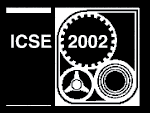 |
|
 |
Home
Conference Updates
Advance Program
Overview
Technical Papers
Conference Keynotes
Tutorials
Workshops
Industry Presentations
State-of-the-Art Presentations
Doctoral Symposium
IMPACT Presentations
Panels
Co-Located Events
Posters and Demos
Exhibitors
Call For Participation
Types of Submissions
Student Volunteers
Conference Calendar
Program At-A-Glance!
Conference Meetings
Conference Information
Conference Committee
Program Committee
Sponsors and Supporters
Advice for Newcomers
Registration
Overview
Travel Information and Events
Overview
Conference Hotel
Discount Airfares
Discount Airport Shuttle
Discount Theme Park Tickets
Securing a Visa
Spouse Program
ICSE 5K Run
Related Conferences
Other ICSE Conferences
ICSE 2002 Technical Paper Topic Areas
ICSE 2002 encourages submissions from the many perspectives that contribute to the whole of Software Engineering. We particularly encourage papers addressing topics wherein software engineering issues play a key role, but where those topics have not been highlighted in previous ICSEs. We encourage discussions of both the process and outcome of research, design, engineering, development, installation, use, and maintenance.
Example Topics
| Requirements Engineering | Acquisition, modeling, specification, prototyping, and analysis requirements. |
|---|---|
| Software Architectures | Domain-specific software architectures, evaluation of architectures, architecture description languages, supporting environments, architecture development approaches, and marketplace issues. Issues with specific architectural styles, such as client-server, event-based, and blackboard architectures. Development of architectures. |
| Hypermedia | Establishing and navigating links among disparate artifacts. Use of hypermedia in software development and evolution. Configuration management of hyperwebs used to support software evolution. Navigation paradigms. |
| Design | Design methods and strategies, languages, and evaluation of designs. Design patterns. |
| Reuse | Technologies, tools, and strategies for developing reusable software. Issues in changing organizations to support and reward reuse. Legal issues. |
| Object-Oriented Technology and Patterns | Development and specification of interfaces, encapsulation issues, changing the interfaces over time, adapting components. Codification and regularization of standard solutions to typical problems. |
| Programming Languages and Software Engineering | Language issues in component description and implementation. Dynamic components. Generic components. Language issues in system evolution. Language issues in software deployment (a la Java). |
| Knowledge-Based Approaches | Applications of automated reasoning, knowledge representation, and artificial intelligence techniques to software engineering problems. Techniques may be fully automatic, may support, or may cooperate with humans. |
| Information Retrieval, Digital Libraries, and Information Systems Design |
Software engineering issues in the construction or use of information retrieval systems and digital libraries, including issues of filtering, routing, and integration with other aspects of an enterprise's computing. Special techniques for information systems design. |
| Mobile Computing and Mobile Applications | Design issues, dynamic languages and application architectures, quality assurance, configuration management, deployment, and operations management. |
| Reliability | Development of operational profiles. Reliability models. Assessment of value. |
| Formal Methods | Formal approaches to specification |
| Testing, Analysis, and Verification | Algorithms, techniques, and processes concerned with assuring, developing, or assessing software with respect to requirements or goals. Development, analysis, and testing. Reverse engineering and program transformation. Incremental approaches to dealing with legacy software. |
| Environments | Organization and integration principles. Object management support, language-directed tools. |
| Software Process | Modeling, analysis, execution, evolution. Formalisms and support tools. Integration with environments. Empirical evaluations, identification of processes through empirical means. Process improvement. Strategies, approaches, and experiences in enhancing organizations' corporate abilities. Process assessment strategies. Demonstration of benefits. |
| Workflow, Computer Supported Cooperative Work (CSCW) and Software Engineering |
Supporting and coordinating teams of software engineers. Workflow and process specification and execution. |
| Project Management | The relationship of organizational structure to product characteristics. Tools for management support. Team restructuring, and relation to software processes and process technology. |
| Measurement, Metrics, Experimentation | Integration of metrics gathering and evaluation into processes. Experimental paradigms for software research. Integration of multiple metrics. |
| Distributed and Parallel Systems | Special software requirements, design issues, and real-time and safety-critical systems. |
| Software Documentation | Documentation in an era of the Web and multimedia. Video and audio documentation. Information retrieval issues and approaches to software documentation. |
| Application of Artificial Intelligence Techniques | Design environments, evaluation agents, knowledge-based approaches. |
| Human-Computer Interaction (HCI) | The role and relation of HCI research to requirements engineering, usability assessment. User involvement in system specification, design, and implementation. Ethnographic studies and software development. |
| Technology Transfer, Education | Software engineering curriculum design. Teaching issues of large-scale systems in the classroom. |
| Standards and Legal Issues | De facto and unofficial standards. Evolution of standards in a highly dynamic world. Standards formation processes. Recent and influential standards from OMG and others. |
| Interoperability | Between languages, frameworks, platforms, components, processes, object repositories, and environments. |
| Module Interconnection Languages | MILs and rapid prototyping. MILs and software architecture research. |
| Configuration Management | Version control and system evolution. Integration of configuration management tools with environments. |


